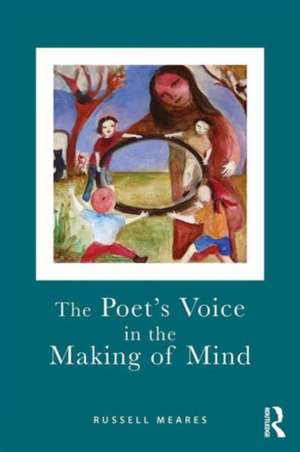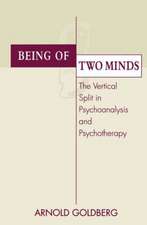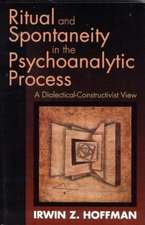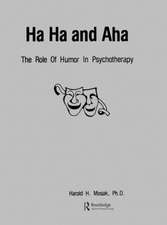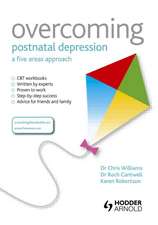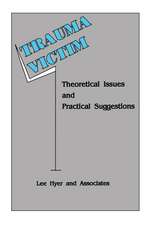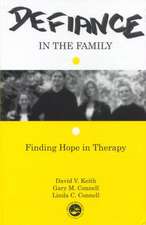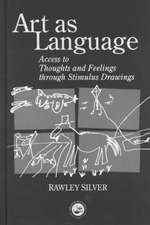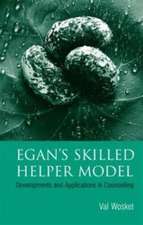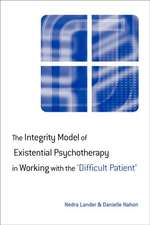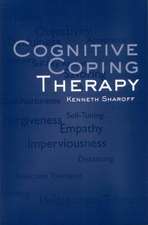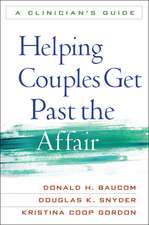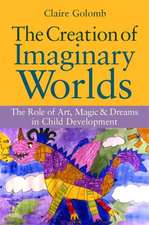The Poet's Voice in the Making of Mind
Autor Russell Mearesen Limba Engleză Paperback – 18 mar 2016
In The Poet’s Voice in the Making of Mind, Russell Meares presents a fascinating inquiry into the origin of mind. He proposes that the way in which mind, or self, evolved, may resemble the way it emerges in childhood play and that a poetic, analogical style of thought is a biological necessity, essential to bringing to fruition the achievement of the human mind. Taking a fresh look at the language used in psychotherapy, he shows how language, and conversation in particular, is central to the development and maintenance of self. His theory incorporates the ideas from William James, Hughlings, Jackson, Janet, Hobson, Gerald Edelman, Wolf Singer, Vygotsky and others. It is illuminated by extracts from literary artists such as Wallace Stevens, W.S. Merwin, Virginia Woolf, Joseph Conrad and Shakespeare.
Encompassing psychotherapy; psychoanalysis; evolution; child development; literary criticism; philosophy; studies of mind and consciousness, The Poet’s Voice in the Making of Mind is an engaging, ground-breaking and thought-provoking work that will appeal to psychotherapists and psychoanalysts, as well as anyone interested in the emergence of mind and self.
| Toate formatele și edițiile | Preț | Express |
|---|---|---|
| Paperback (1) | 327.51 lei 43-57 zile | |
| Taylor & Francis – 18 mar 2016 | 327.51 lei 43-57 zile | |
| Hardback (1) | 1096.68 lei 43-57 zile | |
| Taylor & Francis – 18 mar 2016 | 1096.68 lei 43-57 zile |
Preț: 327.51 lei
Preț vechi: 344.75 lei
-5% Nou
Puncte Express: 491
Preț estimativ în valută:
62.67€ • 65.61$ • 51.85£
62.67€ • 65.61$ • 51.85£
Carte tipărită la comandă
Livrare economică 07-21 aprilie
Preluare comenzi: 021 569.72.76
Specificații
ISBN-13: 9780415572347
ISBN-10: 0415572347
Pagini: 238
Dimensiuni: 156 x 234 x 15 mm
Greutate: 0.34 kg
Ediția:1
Editura: Taylor & Francis
Colecția Routledge
Locul publicării:Oxford, United Kingdom
ISBN-10: 0415572347
Pagini: 238
Dimensiuni: 156 x 234 x 15 mm
Greutate: 0.34 kg
Ediția:1
Editura: Taylor & Francis
Colecția Routledge
Locul publicării:Oxford, United Kingdom
Public țintă
Postgraduate, Professional, and Professional Practice & DevelopmentCuprins
Introduction: Conversational play and the Evolution of Self. James: What we Mean by Personal Selves. Analogy and Truth. Brain Bases of Self.The Poet’s Voice.Little Emotions. Empathy and Utterance. Pointing and Depicting. Myth and Proto-Myth. Action Patterns and the Evolution of Language. The Doubleness of Shakespeare. Impediments to Proto-conversation: Blindness and Deafness. The Shape of Culture and Self. An Evolutionary Hypothesis. Automorphosis: The Dreams of Wolfgang Pauli. Personal Myth.
Notă biografică
Russell Meares is Emeritus Professor of Psychiatry at the University of Sydney. He trained in psychiatry at the Royal Bethlem and Maudsley Hospitals, where he formed an enduring friendship with the late Robert Hobson, with whom he collaborated to develop the Conversational Model of psychotherapy, devised to treat people who could not be treated by other means and who would now be called "borderline." His most recent books for Routledge include are Intimacy and Alienation (2000) and The Metaphor of Play (revised and enlarged edition) (2005)
Recenzii
The Poet’s Voice in the Making of Mind is a truly monumental work, the product of Meares’ lifetime exploration of the development of symbolization, language, and the self. It is a beautifully written book in which Meares speaks with the unassuming intelligence of the finest of teachers. Meares brings to life, in a highly thought-provoking way, aspects of the work of William James, Edelman, Geertz, Cassirer, Trevarthan, Vygotsky, Hughlings Jackson, Hobson and other major contributors to the study of human development. But the triumph of this book lies in Meares’ ability to encompass their ideas and the voices of poets, as well as his own original contributions, and to go on to offer a unifying conception of the development of symbolization, language, self, and culture—a unifying view that the reader will find nowhere else. This is one of the finest books I have read on the subject of what is uniquely human. - Thomas Ogden
This beautifully written book is rich in information for psychotherapists, psychologists, neuroscientists, as well as philosophers and physicists, on the poetry of life. Russell Meares’ humanism transcends disciplinary boundaries, offering a picture of the developing personal self as made for discovery of joy in intimate and responsive company; for sharing the symbolic "make believe" of culture. The emotional foundations of metaphor he finds in the melody of mothers’ conversations with infants gives hope for those who have suffered extreme misfortune in living and sharing life, a way to help them recover self-confidence and a feeling for the common sense of life. - Colwyn Trevarthen, Emeritus Professor of Child Psychology and Psychobiology, Department of Psychology, The University of Edinburgh, Scotland, UK
In this remarkable feat of scholarship, Russell Meares offers a large body of evidence from science, including very recent neuroscience, physics, cognitive science, developmental psychology and anthropology, in order to more deeply elucidate the central questions about the human condition long addressed by poetry, literature, and philosophy. Utilizing an interpersonal neurobiological perspective, he offers a compelling central thesis, that right brain-to-right brain affective communications between mother and infant in early proto-conversations play an essential role in the development and expression of not only all later emotional functions, but also higher cognitive functions, including symbolization, metaphor, music, poetry, higher forms of consciousness, and indeed the self and culture. This groundbreaking integrative work represents a creative interdisciplinary bridge between the sciences and humanities. - Allan N. Schore, Ph.D., Department of Psychiatry and Biobehavioral Sciences, University of California at Los Angeles David Geffen School of Medicine
This beautifully written book is rich in information for psychotherapists, psychologists, neuroscientists, as well as philosophers and physicists, on the poetry of life. Russell Meares’ humanism transcends disciplinary boundaries, offering a picture of the developing personal self as made for discovery of joy in intimate and responsive company; for sharing the symbolic "make believe" of culture. The emotional foundations of metaphor he finds in the melody of mothers’ conversations with infants gives hope for those who have suffered extreme misfortune in living and sharing life, a way to help them recover self-confidence and a feeling for the common sense of life. - Colwyn Trevarthen, Emeritus Professor of Child Psychology and Psychobiology, Department of Psychology, The University of Edinburgh, Scotland, UK
In this remarkable feat of scholarship, Russell Meares offers a large body of evidence from science, including very recent neuroscience, physics, cognitive science, developmental psychology and anthropology, in order to more deeply elucidate the central questions about the human condition long addressed by poetry, literature, and philosophy. Utilizing an interpersonal neurobiological perspective, he offers a compelling central thesis, that right brain-to-right brain affective communications between mother and infant in early proto-conversations play an essential role in the development and expression of not only all later emotional functions, but also higher cognitive functions, including symbolization, metaphor, music, poetry, higher forms of consciousness, and indeed the self and culture. This groundbreaking integrative work represents a creative interdisciplinary bridge between the sciences and humanities. - Allan N. Schore, Ph.D., Department of Psychiatry and Biobehavioral Sciences, University of California at Los Angeles David Geffen School of Medicine
Descriere
This builds on Meare's previous work, it develops his theories about the sense of self, and takes a fresh look at the language used in psychotherapy
